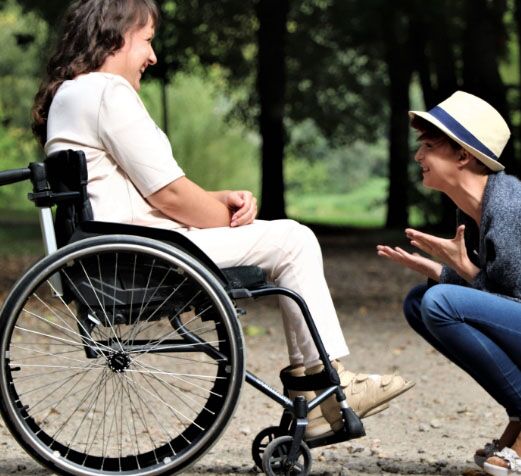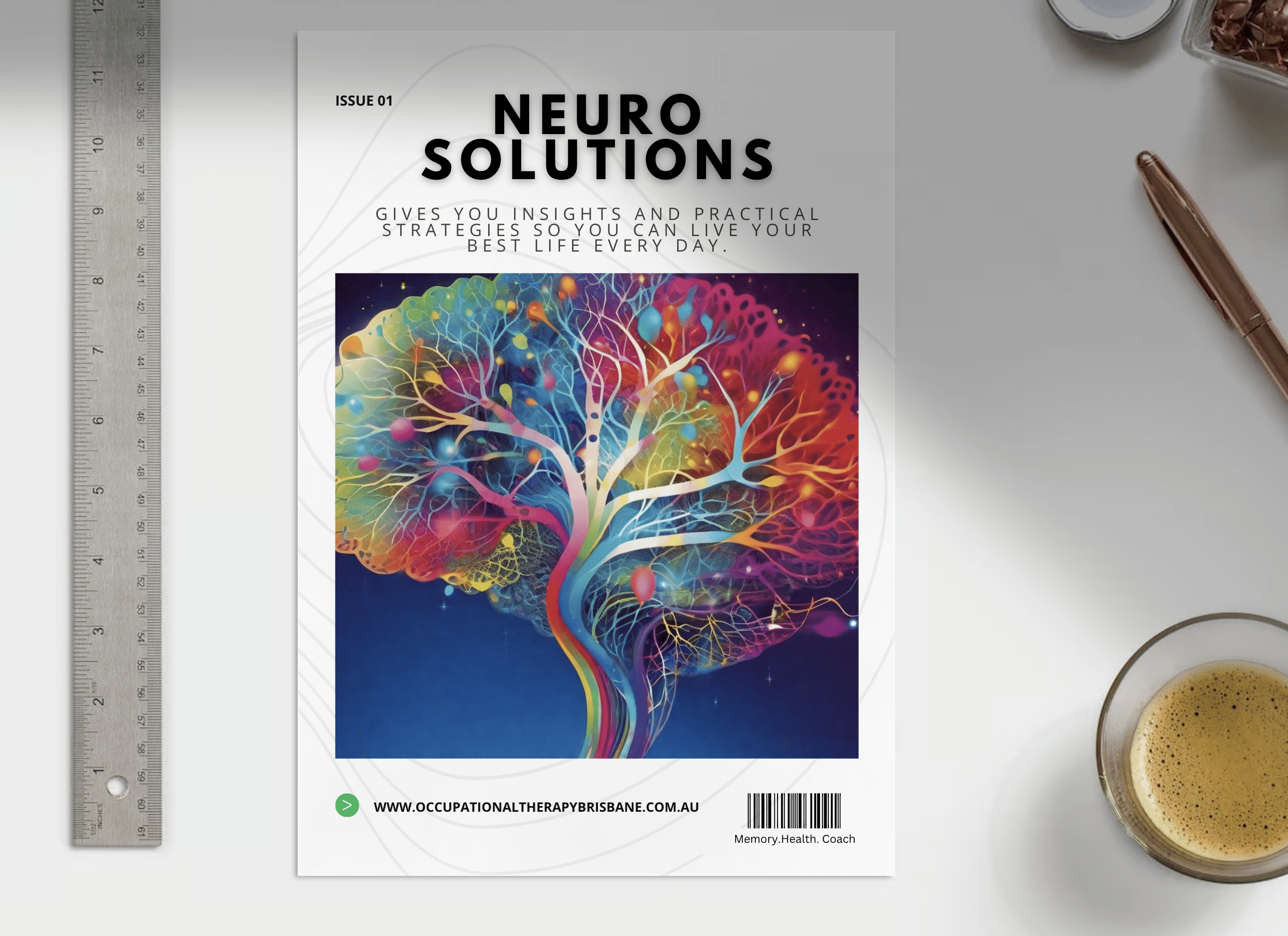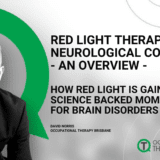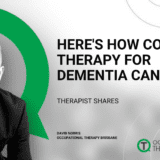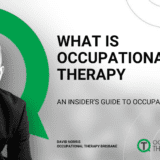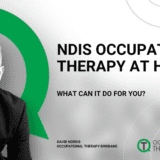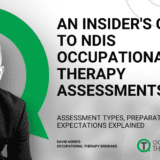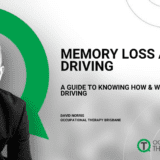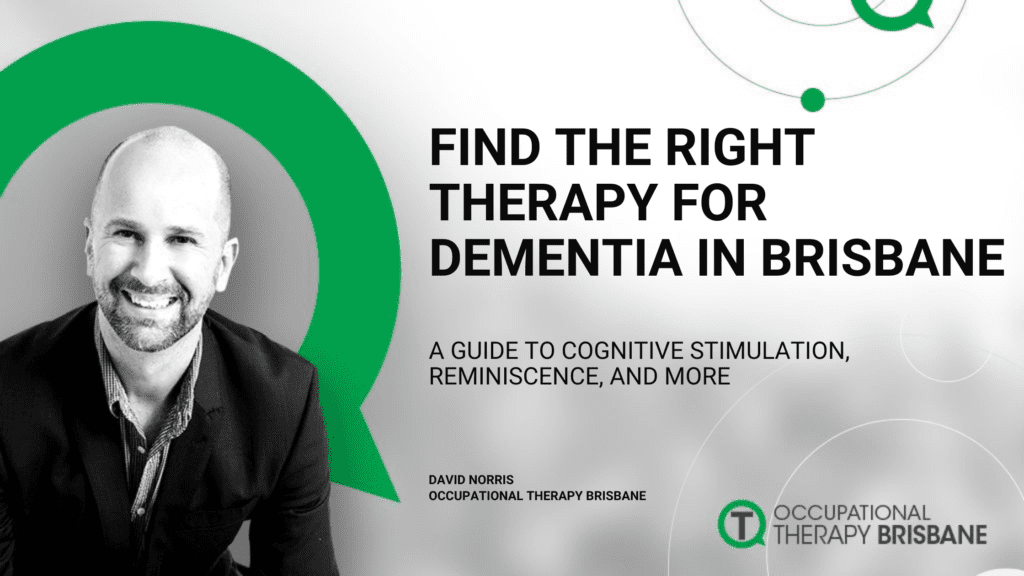
Living with dementia in Brisbane can be challenging, small-ish city, spread out services, heat and humidity, trawling the internet, trying to evaluate what’s right for me – yep, this can be a daunting task. There’s also lot of options when it comes to therapy for dementia and being clear on what’s right for you, well that also is dependent on a few factors.
That said, over the years through our occupational therapy for dementia services we’ve observed how people can maintain their independence, improve their quality of life, and continue to live meaningful lives with the right programs, matched to where they are at in their lives.
Whether you’re a caregiver, a healthcare professional, or someone who is simply interested in learning more about this topic, this article is for you.
With the information provided, those living with dementia in Brisbane can make informed decisions about the best therapy options for them.

Can dementia be treated with therapy?
While no single treatment can cure dementia or slow down the damage it causes, research has found that cognitive stimulation therapies, caregiver skills training, memory training, lifestyle modifications and reminiscence to name a few can help live life better.
Yes, “Therapy for dementia” is a broad term that encompasses a range of treatments, activities, and interventions designed to support individuals with dementia and their caregivers.
THERAPY OPTIONS MAY DEPEND ON THE STAGE OF DEMENTIA
There are often described 3 stages of dementia and these represents the dementia symptoms. Specifically they refer to the changes to a person’s memory and functional skills.
Early Stage or Mild dementia is characterised by mild memory loss and difficulty with complex tasks;
Middle Stage or Moderate dementia is where a person’s experiences greater impact of cognitive decline. This may be observed as confusion and impaired judgement and they are needing support with daily activities to prompt or cue their performance.
Late stage or Severe dementia is marked by significant cognitive impairment, inability to communicate, and reliance on others for all aspects of care.
You’d appreciate that some therapy will be dependent on the severity of dementia.
No doubt, Dementia is a progressive condition, with symptoms of dementia becoming more severe as the disease advances. Dementia is an umbrella term that includes conditions like Alzheimer’s disease and Vascular dementia. We’ve explored the differences between Alzheimer’s Disease Vs Dementia before.
If you’re a family member worried about your loved one and are concerned they may be experiencing dementia, then this article “children worried about parents with dementia” may be of help.
So, let’s dive into the therapy options for people with dementia, and see how they can help improve quality of life for all involved.

Non-Drug Therapies For Dementia
In addition to the specific therapies listed in this article, there’s other non-drug therapies that can help improve quality of life for people with dementia.
This is a broad and encompassing term that can refer to many therapy approaches and this is where it can get confusing for people. It can include music therapy, art therapy, and aromatherapy for example.
We’ve observed that these therapies have possible benefits for a person even if they have a lived experience, say for example with art activities.
On the flip side, we’ve also seen that people who have had advanced skills in these tasks can, at times, experience frustration, grief like experiences when attempting to do an activity which they had mastery in their life, but may be more challenging now.
This is where an OT can help.

Occupational Therapy For Dementia
Occupational therapy can help people with dementia maintain their independence and daily living abilities for as long as possible. To achieve this goal, an OT will likely use a variety of different approaches tailored to your unique needs. This can include training on how to perform daily activities, such as bathing and dressing, as well as exercises to improve fine motor skills and hand-eye coordination.
Furthermore, your OT can also design personalised cognitive therapy programs, prescribe assistive aids and home modifications to help you.
Let’s have a look in more detail at some of these options.

Cognitive Therapy and Dementia
Cognitive Stimulation Therapy (CST) or Cognitive Therapy For Dementia is an intervention that focuses on keeping the mind active and engaged, through activities like problem-solving, memory games, and discussions about current events. It can help slow down cognitive decline and improve quality of life.
According to the UK 2018 NICE guidelines, CST should be used for people with mild to moderate dementia in order to enhance cognition, independence and wellbeing. This is the only non-pharmaceutical intervention that has been suggested for cognitive symptoms and maintaining function.
Under this therapy umbrella you can also consider Memory Training. Beyond just memory games and exercises, this type of therapy aims at maximising independence in daily life by developing cognitive strategies. In the early stages of dementia, this form of therapy can help a person be more consistent with their daily routine.
Beyond practical skills therapy can involve repeating names, faces, and other information, and using visual aids like flashcards. As early as 2011, the World Alzheimer’s Report indicated that cognitive stimulation therapy should be given to people at early stages of dementia.
For people with early or moderate stages of dementia you may benefit from access the Cognitive Fitness Program a 12 session program. Enquire today by call 1300 783 200 or simply click “Get Connected” button on this page.

Validation Therapy
Understanding and accepting the person with dementia’s perspective is at the heart of this approach.
For loved ones, caregivers and health professionals it means that you’re respecting the person’s reality, without correcting them or attempting to bring them back to reality.
The person with dementia as well as their supports report positive effects where they are less stressed and agitated and overall well-being is improved.

Reminiscence Therapy
Reminiscence therapy involves talking about past experiences, such as childhood memories, family history, and past events. It can also be connect and using objects, tools and materials from the past as well. It can help people with dementia feel connected to their past, and provide them with a sense of purpose and fulfillment.

Behaviour Management
Managing challenging behaviors commonly associated with psychological symptoms is a common concern for caregivers of people with dementia, and there are several strategies that can be effective.
Apathy, depression, anger, frustration, wandering are all reported behaviours that can impact on person’s quality of life as well as their loved ones and the care supports.
Some the strategies can include redirecting the person with dementia, using positive reinforcement, and creating a safe and supportive environment and connecting people with meaningful activities.
We appreciate that jumping to a strategies feels like the right thing to do, however, getting to the right strategies starts with a relevant assessment of dementia symptoms. This helps you get clear on the factors driving the behaviours and can ultimately help with thriving and coping at home. This care giver’s article on Coping with Dementia Behaviours may be just what your looking for.

Activity Planning and Environmental Design
Creating a safe, accessible, and stimulating environment can help improve quality of life for people with dementia.
This can involve home modifications, such as adding grab bars and removing tripping hazards, as well as planning activities that are engaging and meaningful.

Lifestyle Modification
Making changes to your lifestyle, such as eating a healthy diet, getting enough sleep, and engaging in physical activity, can help improve overall health and well-being for a person living with dementia.
For people experiencing Mild Cognitive Impairment a 2020 study reported “improvements in lifestyle risk factors for dementia can lead to improvements in cognition over a short time frame with a population experiencing cognitive decline“
The treatment applied exercises, cognitive therapy and nutritional advices in short a lifestyle program much like what we offer at OT Brisbane.

Assistive Technology For Dementia
Assistive technology, such as voice-controlled devices and reminder apps, can help people with dementia maintain their independence and manage their daily routines an work around memory changes.
This can include devices that remind them to take their medications, track their eating and sleeping habits, and help them stay connected with loved ones.

Strength-based Therapy For Dementia
Strength-based therapy for a person with dementia focuses on an individual’s abilities and strengths, rather than their limitations and deficits.
The goal of this therapy is to help people with dementia find meaning and purpose in their lives, and to support their ability to engage in meaningful activities and relationships.
It can involve creating opportunities for people with dementia to connect with others and contribute to their communities.
By focusing on an individual’s strengths, this approach can help improve their mood, reduce feelings of isolation, and enhance their sense of purpose and well-being.

Skills Training For Caregivers
Being a caregiver for someone with dementia can be challenging, and it’s important for caregivers to have the skills and knowledge they need to provide the best possible care.
This can include training on how to manage challenging behaviors, how to provide meaningful activities, and how to care for someone with dementia.
Self Care for Caregivers
Caring for someone with dementia can be physically and emotionally draining, and it’s important for caregivers to take care of themselves, too. This can include taking breaks, getting enough sleep, eating well, and engaging in activities they enjoy.
Animal Assisted Therapy
Animals can have a calming effect on a person with dementia, and animal-assisted therapy has been shown to improve mood, reduce stress, and promote feelings of well-being. This can involve therapy dogs, horse therapy, and even therapy birds.

Light Therapy or Photobiomodulation
Light therapy has been shown to be an effective treatment for several health conditions, including depression and seasonal affective disorder. It involves exposure to bright light, usually in the form of a light box.
More recent developments have used near infrared light therapy which reported to help improve sleep, reduce stress, and improve overall mood in people with dementia.

Transcranial Direct Magnetic Stimulation
This therapy involves applying a magnetic field to the brain help. The evidence associated with this therapy has demonstrated improvement in symptoms of depression and anxiety. For people living with dementia, this is an emergent research area and more is needed.

Neurofeedback
Neurofeedback is a form of therapy that trains the brain to function more efficiently. Some interventions are referred to as “Brain Brightening” which highlights the approach of therapy to improve attention and concentration.
There’s modest evidence in this area which reports effects of improved memory, focus, and overall cognitive function in people with dementia. The treatment methods are diverse so it makes it challenging to compare approaches and this is the headache of the research community.
Rehabilitation Methods for People Living with Dementia
A 2021 review looked at various interventions and their effectiveness in improving the quality of life for people with dementia.
The authors concluded that rehabilitation methods offer a “practical framework to maximize independence and community participation in dementia care” such as cognitive stimulation therapy and reminiscence therapy, have shown to be effective in improving cognitive function, reducing behavioral and psychological symptoms, and increasing the overall well-being of people living with dementia.
Additionally, the study found that multidisciplinary approaches, such as combining rehabilitation methods with pharmacotherapy, resulted in better outcomes compared to using only one method. The findings of this study highlight the importance of tailoring rehabilitation methods to the individual needs and goals of each person with dementia.

Therapy Programs For Dementia In Brisbane
At Occupational Therapy Brisbane, we believe that every individual with dementia has the capacity to live a meaningful and fulfilling life.
That’s why we’ve developed our “Functional for Life” program, which is designed to meet the unique needs and goals of each person. Our program takes into consideration the individual’s stage of dementia experience, as well as their strengths, to tailor a personalised therapy plan.
Our experienced therapists work closely with each person and their family to understand their needs and design a therapy plan that is tailored to their individual goals. Whether it’s improving daily living skills, maintaining independence, or simply engaging in enjoyable activities, our therapists are committed to helping each person achieve their full potential.
We’re passionate about helping people with dementia live their best life, and we believe that our “Functional for Life” program is the key to achieving this goal.
Yes, referrals are accepted by people being supported by NDIS, (plan and self managed), Aged Care, Medicare or Private Health or Self funded are all welcome.
If you’re looking for a personalised therapy plan that meets the unique needs of someone with dementia, look no further than Occupational Therapy Brisbane.
Call us now on 1300 783 200 to learn more about our “Functional for Life” program and how we can help you or a loved one achieve a better quality of life.
Article Sources and Scientific Evidence
- Gupta A, Prakash NB, Sannyasi G. Rehabilitation in Dementia. Indian J Psychol Med. 2021 Sep;43(5 Suppl):S37-S47. doi: 10.1177/02537176211033316. Epub 2021 Aug 31. PMID: 34732953; PMCID: PMC8543618.
- Ravn MB, Petersen KS, Thuesen J. Rehabilitation for People Living with Dementia: A Scoping Review of Processes and Outcomes. J Aging Res. 2019 Jun 2;2019:4141050. doi: 10.1155/2019/4141050. PMID: 31275651; PMCID: PMC6589218. Source: https://pubmed.ncbi.nlm.nih.gov/31275651/
Clare L, Kudlicka A, Oyebode JR, Jones RW, Bayer A, Leroi I, Kopelman M, James IA, Culverwell A, Pool J, Brand A, Henderson C, Hoare Z, Knapp M, Morgan-Trimmer S, Burns A, Corbett A, Whitaker R, Woods B. Goal-oriented cognitive rehabilitation for early-stage Alzheimer’s and related dementias: the GREAT RCT. Health Technol Assess. 2019 Mar;23(10):1-242. doi: 10.3310/hta23100. PMID: 30879470; PMCID: PMC6441850.
Wong YL, Cheng CPW, Wong CSM, Wong SN, Wong HL, Tse S, Wong GHY, Chan WC. Cognitive Stimulation for Persons with Dementia: a Systematic Review and Meta-Analysis. East Asian Arch Psychiatry. 2021 Sep;31(3):55-66. doi: 10.12809/eaap2102. PMID: 34588315.
Cardona MI, Afi A, Lakicevic N, Thyrian JR. Physical Activity Interventions and Their Effects on Cognitive Function in People with Dementia: A Systematic Review and Meta-Analysis. Int J Environ Res Public Health. 2021 Aug 19;18(16):8753. doi: 10.3390/ijerph18168753. PMID: 34444501; PMCID: PMC8394441.
- Izquierdo, M., Merchant, R.A., Morley, J.E. et al. International Exercise Recommendations in Older Adults (ICFSR): Expert Consensus Guidelines. J Nutr Health Aging 25, 824–853 (2021). https://doi.org/10.1007/s12603-021-1665-8
Saragih ID, Tonapa SI, Yao CT, Saragih IS, Lee BO. Effects of reminiscence therapy in people with dementia: A systematic review and meta-analysis. J Psychiatr Ment Health Nurs. 2022 Dec;29(6):883-903. doi: 10.1111/jpm.12830. Epub 2022 Apr 17. PMID: 35348260.
Alzheimer’s Disease International (2011), World Alzheimer Report 2011: The benefits of early diagnosis and intervention
- Trazoki Eider, Contreras-Somoza Leslie María, Toribio-Guzmán José Miguel, Jenaro-Río Cristina, van der Roest Henriëtte, Franco-Martín Manuel A., (2020) Technologies for Cognitive Training and Cognitive Rehabilitation for People With Mild Cognitive Impairment and Dementia. A Systematic Review. Source: https://www.frontiersin.org/articles/10.3389/fpsyg.2020.00648
NICE (2018) Dementia: assessment, management and support for people living with dementia and their carers
- McMaster, M., Kim, S., Clare, L., Torres, S.J., Cherbuin, N., DʼEste, C. and Anstey, K.J. (2020), Lifestyle Risk Factors and Cognitive Outcomes from the Multidomain Dementia Risk Reduction Randomized Controlled Trial, Body Brain Life for Cognitive Decline (BBL-CD). J Am Geriatr Soc, 68: 2629-2637. https://doi.org/10.1111/jgs.16762


